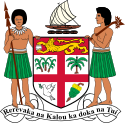- Chairman of the Great Council of Chiefs (Fiji)
-
Nobility of Fiji Titles
Adi - Bulou
Ro - Roko - Ratu
Institutions
Great Council of Chiefs
Chairman, Great Council of Chiefs
House of Chiefs
Confederacies:
Burebasaga - Kubuna - Tovata
Rotuman Traditional Leadership
Gagaja - Sau - Fakpure - MuaFiji 
This article is part of the series:
Politics and government of
FijiExecutive
- President (List)
- Vice-President
- Vacant
- Prime Minister
- Cabinet
- Attorney-General
- Leader of the Opposition
Legislative
- Parliament
- Senate
- House of Representatives
- Speaker
- Vacant
- Speaker
Former/informal institutions
- Chairman, G.C.C.
- Diplomatic missions
The Great Council of Chiefs (Bose Levu Vakaturaga in Fijian) is a formal assembly of Fiji's senior hereditary chiefs, along with some representatives of the national government and provincial councils, who may or may not be hereditary chiefs themselves. It also has a constitutional role in functioning as an electoral college to choose the President of the Republic, as well as 14 of the 32 Senators.
Following the adoption of the ministerial system of government in 1967, the Minister for Fijian Affairs (the Cabinet Minister responsible for indigenous cultural and economic development) presided over the Great Council of Chiefs. This arrangement continued until the constitutional changes of 1999, when the Great Council chose its own Chairman for the first time.
The following tables list the Fijian Affairs Ministers from 1967 to 1999, and Chairmen of the Great Council of Chiefs since that date.
Ministers for Fijian Affairs (1967 - 1999)
Ministers of Fijian Affairs since 1999 are not included, as they no longer preside over the Great Council. If the Minister was simultaneously the Prime Minister, this is indicated by an asterisk.
Order Minister Term of Office Prime Minister served under 1. Ratu Sir Penaia Ganilau 1967–1970 Ratu Sir Kamisese Mara 2. Ratu Sir George Cakobau 1970–1972 3. Ratu William Toganivalu 1972–1977 . Ratu Sir Penaia Ganilau 1977–1983 4. Ratu Sir Kamisese Mara 1983–1985 * 5. Ratu David Toganivalu 1985–1987 Ratu Sir Kamisese Mara 6. Timoci Bavadra 1987 * 7. Ratu Josua Toganivalu 1987 Governor-General
Ratu Sir Penaia Ganilau8. Ratu Meli Vesikula 1987 9. Vatiliai Navunisaravi 1987–1992 Ratu Sir Kamisese Mara 10. Sitiveni Rabuka 1992–1994 * 11. Adi Samanunu Cakobau Talakuli 1994–1995 Sitiveni Rabuka . Sitiveni Rabuka 1995–1997 * 12. Ratu Finau Mara 1997–1999 Sitiveni Rabuka Chairmen of the Great Council of Chiefs (1999 - present)
Since 1999, when the Council chose its own chairman for the first time, the following individuals have held the office. In April 2007, the Council was suspended by "interim prime minister" and military leader Frank Bainimarama, who had taken power in a coup in December 2006. In February 2008, Bainimarama announced that he was appointing himself chairman of the Council.[1][2] In early August 2008, it was announced that the Great Council of Chiefs was ready to reconvene. It would be chaired by the Minister for Fijian Affairs - namely, at that time, Commodore Bainimarama.[3] In October 2008, Ratu Epeli Nailatikau was named Minister of Indigenous (Fijian) Affairs, and therefore also Chairman of the Great Council of Chiefs.[4]
In April 2009, Nailatikau was appointed Vice-President of Fiji.[5] As he is no longer Minister for Indigenous Affairs, it is not yet clear whether he remains Chairman of the Council.
Order Chairman Term of Office 1. Sitiveni Rabuka 1999–2001 2. Ratu Epeli Ganilau 2001–2004 3. Ratu Ovini Bokini 2004-April 2007 4. Frank Bainimarama February 2008-October 2008 5. Ratu Epeli Nailatikau October 2008 – present References
- ^ "Bainimarama is GCC head", Frederica Elbourne, Fiji Times, 19 February 2008
- ^ "Fiji’s interim Prime Minister appoints himself chairman of Great Council of Chiefs". Radio New Zealand International. 18 February 2008. http://www.rnzi.com/pages/news.php?op=read&id=38104. Retrieved 23 September 2011.
- ^ "Fiji Great Council of Chiefs ready to convene", ABC Radio Australia, 5 August 2008
- ^ "Ratu Epeli is new GCC chairman", FijiLive, 14 October 2008
- ^ "President's deputy sworn in", Fiji Times, 17 April 2009
Categories:- Fijian nobility
- Government of Fiji
- Lists of office-holders by country
- Politics of Fiji
- Fiji-related lists
Wikimedia Foundation. 2010.
